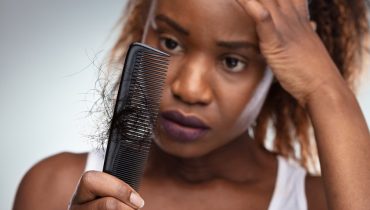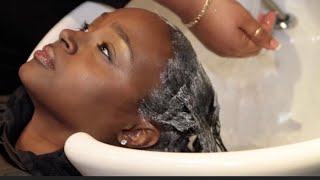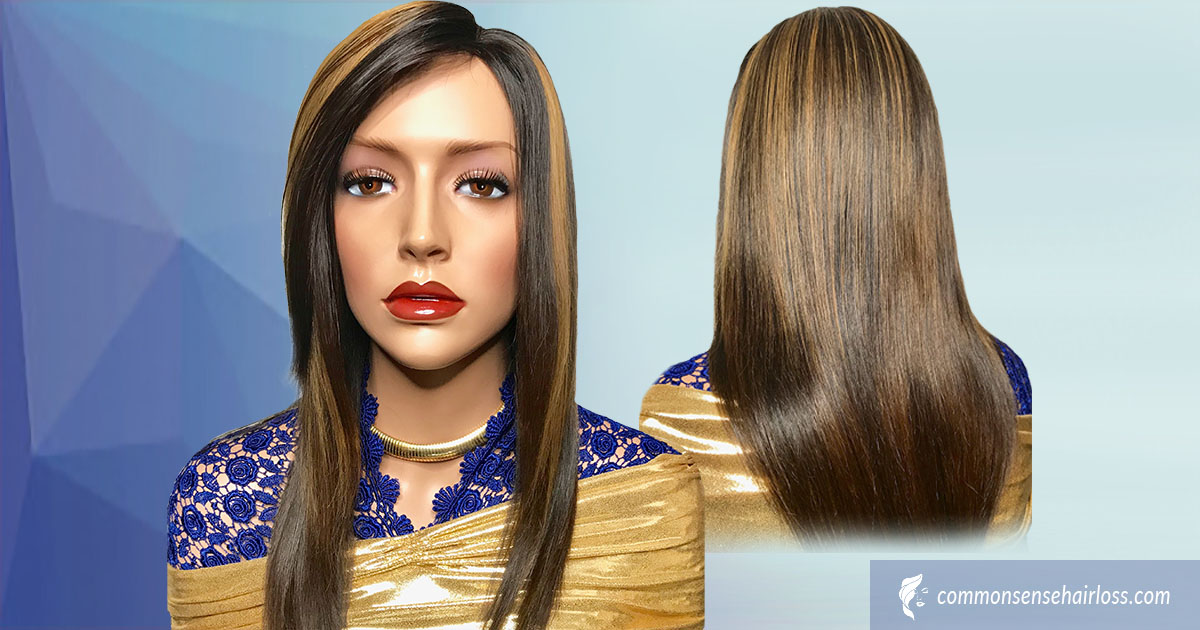Hair Relaxers Linked To High Uterine Fibroid Risks Among Black Women? Unlikely

No doubt some of you have experienced a love-hate relationship with relaxers. They have been demonized but perhaps nothing has been more scathing than the Boston University study back in 2012 that linked hair relaxers to high uterine fibroid risk among black women.
Over the years the relaxer has become quite a mainstay in the black community as it presents styling options that could not be achieved if the hair is in its natural state. We’ve mastered the art so much so that many of us no longer feel it necessary to entrust the process to a professional cosmetologist, especially with all the DIY kits on the market.
We are not trying to condone or even encourage the use of relaxers. In the wrong hands they have led to severe hair loss and even chemical burns. In the study mentioned it’s the chemical burns which result from over processing that are cause for concern as it relates to fibroids.
But it is important that we, the black community, base our hair care practices on real facts and not conjecture and poor science. That being said, we will have to mobilize and get the studies done that will once and for all dispel the myths and innuendos we’ve been fed about our hair.
Which brings me back to perhaps one of the most critical studies that need to be done for us, by us: can it be conclusively proven that hair relaxers are linked to high uterine fibroid risks among black women?
We get a little skeptical about studies regarding the black community because more often than not, the people behind the studies have a certain hidden agenda. (You might want to check out the members of Boston University’s Institutional Review Board just for good measure; after all, they approved the study).
I am more inclined to believe the Chris Rock documentary, “Good Hair,” some random study. There’s just something unnerving about seeing a soda can melt down to nothing in the tub of relaxer but that’s a whole other pot of tea (and I digress).
What’s evident is that one commonality between the media and people in general is the “run with it” syndrome; the media is apt to report anything sensational enough to push ratings up in a given day and the general public will often take it as gospel. The thing is that much of it is often done at the expense of accuracy of that information. We think that is exactly what happened with this study so we have decided to go in and try to dissect it to see what the report really revealed and how it matches up to what one other expert says.
 Background of the Study
Background of the Study
The study mentioned was conducted following 59000 black women between the ages of 21-69 years old. The women were from 17 states across the US inclusive of New York, California, Illinois, Michigan, Georgia, and New Jersey.
The women would be sent questionnaires every two years from 1995 through to 2009. After eliminating women with a history of fibroid, women who had reached menopause, those who had incomplete questionnaires and those who stopped co-operating the number dropped to 23580.
The women were asked if they used hair relaxers, whether lye or no lye relaxers were used, when was the first time they used relaxers, how frequently they relaxed and how long they had been using relaxers for.
Of the number a random sampling of the participants numbering 248 persons were sent questionnaires to seek permission to assess their medical records. The findings were as follows:
We obtained medical records from 127 of the 128 women who gave us permission and confirmed the self-report in 122 (96%). Among the 188 (76%) who provided supplemental survey data, 71% reported uterine leiomyomata-related symptoms prior to diagnosis, and 87% reported that their condition came to clinical attention because they sought treatment for symptoms or a tumor was palpable during a routine pelvic examination.
Hmmm, in my humble estimation 127 is a small number I hardly think we can use that as a conclusive indication that relaxers cause fibroid or increase the incidents of fibroid among black women; but hey what do I know?
Now in this study, as far as the hypotheses go, the probability of a link between hair relaxer usage and fibroids in black women hinged on the premise that relaxers contain harsh chemicals that cause burns to the scalp. This in turn was speculated to increase the possibility of the body absorbing those chemicals which could impact on the endocrine function. This is evidenced in the following statement from the conclusion:
Because lye relaxers are thought to contain harsher chemicals (e.g., sodium hydroxide) than no-lye formulations, we hypothesized that women who more often used lye relaxers would have a higher risk of scalp lesions or burns, thereby increasing dermal absorption of putative endocrine-disrupting chemicals.
One potential explanation for the lack of difference in association between lye and no-lye formulations is that both products pose a similar likelihood of scalp lesions and burns. Scalp inflammation and scarring alopecia have been documented anecdotally with both lye and no-lye relaxers (16).
In addition, although most women currently reported using no-lye formulations, most had probably used lye formulations in the past (16), which could have diluted the association. The study had no information on the individual brands of chemical relaxers used or on constituents that might be considered estrogen disruptors.
 However outside of that speculation there was no direct link to be found between the use of hair relaxers and fibroid in black women.
However outside of that speculation there was no direct link to be found between the use of hair relaxers and fibroid in black women.
[…] we are unable to provide insight as to the specific mechanisms by which hair relaxers could have influenced risk.
It is possible that hair relaxer use is a proxy for exposure to other products containing high levels of endocrine-disrupting chemicals (17) and that the hair relaxers themselves are not the causal agents.
The study continued to say:
[…] we observed that the percentage of European ancestry decreased with increasing use of hair relaxers in a subset of women from our cohort, and that adjustment for genetic admixture attenuated the observed associations for hair relaxer use and uterine leiomyomata incidence.
Therefore, although our study raises the hypothesis that hair relaxer use is associated with an increased risk of uterine leiomyomata, we cannot rule out the possibility that greater African ancestry, thought to increase genetic predisposition to uterine leiomyomata (55), explains part or all of the observed association.
In essence they found that the use of relaxers was lower in those with strong European genes. That is to say the more white the woman had in her blood enough to influence her features or physical appearance, the less likely she was to use a relaxer; but, the stronger the African genes in their ancestry the higher the relaxer usage.
In spite of this when they examined the difference between women with stronger African ancestry, and women of more European ancestry, the hair relaxer association practically disappeared.
On January 1, 2014 in a Fox news report that followed up on the study, Fox correspondent Beth Galvin interviewed Dr. Carol Hogue – a professor of epidemiology at Emory’s Rollins School of Public Health – whose professional opinion was that the link between fibroids and hair relaxers is not very strong.
Hogue says, “There is an impact, it is very small[.]” Hogue’s statement basically correlates with the findings of the study since the conclusion basically stated that they cannot say conclusively that hair relaxers cause fibroids in black women. They cannot even say whether the results should be attributed to genetic disposition as a result of African ancestry. What they did say though, is:
Future studies are needed to confirm whether hair relaxer use and uterine leiomyomata are indeed associated.
Well I’m all for future studies and as such, I take the opportunity to implore the learned among us to do the research so we can put the matter to rest.
In conclusion, the study didn’t say hair relaxers cause fibroid in black women and the association is thin at best so I suppose it wasn’t all bad.
Well when you think of it they didn’t exactly rule it out altogether either but hey, for all we know black women just have higher incidences of fibroid because of our genes. I suppose the verdict is still out on this one. In the meantime style responsibly and keep in good health.




